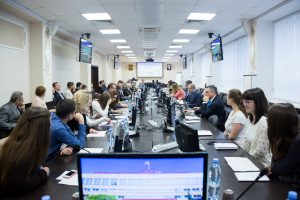Theoretical and computational work on the interaction between electromagnetic radiation and matter, as well as the most advanced techniques employed for the construction of the large particle physics accelerators, also provide useful insights into complex biochemical and biological systems.
These are at the forefront of some among the most urgent and fascinating challenges of all times: improving tumor diagnostics and cure while reducing secondary health effects, making manned deep Space exploration safe and unveiling the primordial conditions that fostered life on our planet. These arguments were in fact just some of the questions that researchers from different fields, ranging from applied nuclear physics to astro- and radiation biology, as well as computational and experimental chemistry, gathered to discussed during a workshop held in Moscow from 6th to 9th June 2016.
Scientists from the Italian Institute of Nuclear Physics (INFN), the Italian National Agency for New Technologies, Energy and Sustainable Economic Development (ENEA), and the Italian Universities of Rome La Sapienza, Federico II of Naples and Viterbo La Tuscia joined colleagues from China, India, France, the Czech Republic and Poland, also of course Russians scientists and students, for the workshop “Interaction of Radiations with Matter. Applications to Life Science on the Earth and in Space”, organized by the Moscow National Research Nuclear University (MEPhI). The event was the last in a series of seminars on the theme “Advanced Accelerator & Radiation Physics” chaired by Prof. MN Strikhanov and Prof. SB Dabagov that are yearly held as part of an ongoing scientific collaboration between MEPhI and the INFN-National Laboratories in Frascati (LNF).
 INFN-LNF Laboratori Nazionali di Frascati
INFN-LNF Laboratori Nazionali di Frascati
